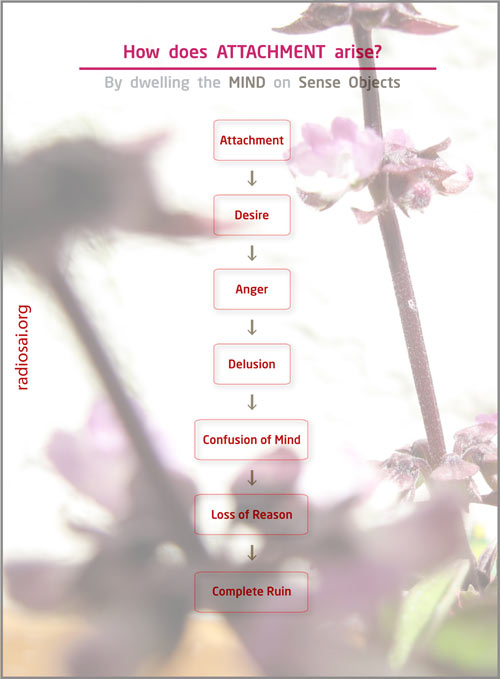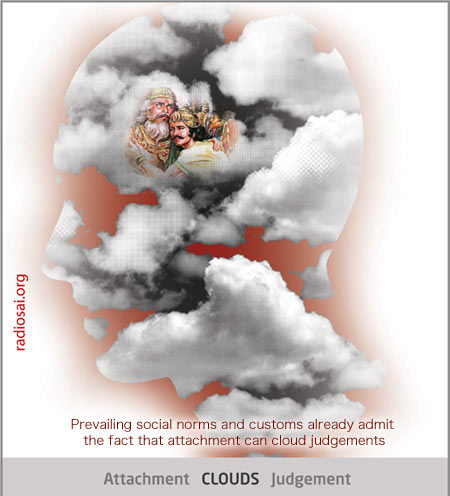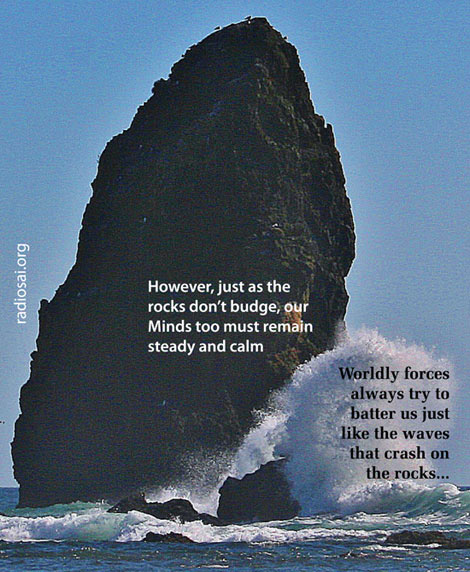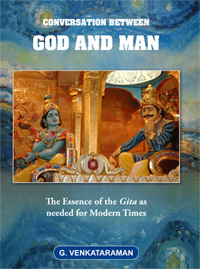|
|
Home >> Feature Article |
| Follow us: |
Posted on : Feb 27, 2012
MUSINGS ON THE GITA – 03
by Prof. G. Venkataraman
The Bhagawad Gita was delivered by Lord Krishna to the warrior prince Arjuna on the battlefield of Kurukshetra as an antidote to the dilemma that arose in him. It was not a choice between right and wrong, rather it was dilemma between the 'apparently' right and 'absolutely' right. Five thousand-odd years later the wisdom of the Gita is still not lost in context in modern times. In fact it is more relevant and needed now than ever.
No wonder then that when the Lord incarnated again as Bhagawan Sri Sathya Sai Baba He did not fail to emphasise the importance of this spiritual treatise. Apart from giving us an entire volume of commentary on the Bhagawad Gita in the Gita Vahini, Baba also has delivered a number of discourses on this classic text. For instance, during August–September 1984, Baba gave a series of 34 discourses on The Bhagawad Gita inside the Bhajan Hall in Prasanthi Nilayam (these have been aired on Radio Sai several times).
Presently we bring you this musing series by Prof. G. Venkataraman which is on the 'Essence of the Gita'. In this modern age of rationalism we tend to refuse to accept anything that is not offered on the platter of scientific approach. And that is what makes this presentation by an eminent scientist a work of unquestionable relevance. He has infact authored a comprehensive book on the Gita: Conversation Between God and Man, which is popular as much for its profundity as its lucid and simple-to-understand conversational style.
The current series of articles is actually an adaptation of a radio series that was produced and aired on Radio Sai on the request of our listeners. In these episodes too Prof. G. Venkataraman has dealt with the teachings of the Gita in a practical, scientific and thematic manner which makes for interesting reading and easy understanding.
Loving Sai Ram and greetings once again from Prasanthi Nilayam. It is truly a wonderful feeling and a blessing at the same time, to bring to you the essence of the Message of the Lord, which is 'Mama Dharma'. This is a word that ought to rule our lives; yet almost everyone on earth is ignorant about it.
The Lord came down earlier as Krishna and now again in the physical form of our beloved Swami, simply to remind us to follow Mama Dharma and never deviate from it. Nevertheless, we are hardly aware of what it is, which is why Radio Sai has decided to offer this series. We hope you like and are able to understand what we are trying to convey. With that introductory note, let me resume from where I left off last time.
Making the Right Choice – The Essence of Sankhya Yoga
In the previous episode, I had started with you on my tour of the Second Chapter of the Gita, entitled Sankhya Yoga, meaning the 'Yoga of Discrimination and Wisdom'. Just to recap, Arjuna who had earlier decided to fight for the cause of Dharma, was, at the last minute, trying to quit. Fighting for Dharma is not easy and most of us tend to chicken out when the price seems to be high.
It is because most of us abandon Mama Dharma for some reason or the other, that the world today is beset with all kinds of problems. And finding ourselves in a huge mess, we ask stupid questions like: “Why did God create this world with all these problems? Why does not God appear and sweep away all these problems with His Divine powers?” Not for a moment do we say: “This is a mess we created, and that is because we systematically chose to ignore the lessons so mercifully given by the Lord not only via sages and prophets, but also during His personal appearances on earth as an Avatar.”
Since it is a mess that we have created, it is evident that it is we who must clean it up; we simply cannot pass the buck and ask God to sweep the chaos that is our making; that would be like adding insult to injury! Man going astray is nothing new, and that is why way back, Lord Krishna told Arjuna where he was going wrong and what he had to do by way of mid-course correction, especially in terms of making the right choice. Making the right choice is what the Second Chapter called the Yoga of Discrimination and Wisdom is all about.
 |
 |
 |
 |
 |
 |
 |
 |
Let me now quickly recall the important points I made last time, before we proceed further. I said the following:
Arjuna was confused about what exactly his duty was. He had two options before him and reasoning in a particular way, he thought it was best for him not to fight. He conveyed his anxiety and doubts to Krishna and sought refuge in Him.
 |
The Lord began by chiding Arjuna and then told him that he was making a wrong choice.
Krishna added that the wrong choice was the result of Arjuna not being able to discriminate properly.
The Lord then pointed out that discrimination would fail when there is attachment.
The Sinister Malady of Attachment
The question now becomes: “How does this attachment arise?” Krishna has the answer in the following Sloka:
Dwelling the Mind on sense objects develops attachments. Attachment leads to desire and desire breeds anger. [2.62]
Krishna continues:
From anger rises delusion; delusion promotes confusion of the Mind; confusion generates loss of reason; and finally, loss of reason leads to complete ruin. [2.63]
He attains peace who conquering desires lives without the feeling “I” or “mine”. [2.71]
It is important to spend some time digesting the above observations of the Lord. Let me start with attachment. Attachment is a feeling entirely connected with this world. We get attached to things we like and to people we like. Among other things, Arjuna was attached to his grandfather, his Guru and his relatives. One might argue, that is but natural. Yes, in a purely worldly sense, attachment is perfectly natural and is to be expected. However, attachment has its dangers; in particular, it can cloud one’s judgement.
Let me give some examples of how attachment can and does cloud judgement. Take the case of the blind King Dhritarashtra. He was so attached to his sons, that he invariably overlooked their faults. That was then, and it happens to be so even now. How frequently we hear of political leaders who are blind to the faults of their family members who exploit the position of the leader concerned.
 |
Consider next a surgeon whose child is very sick and has to be operated upon. Medical ethics require that the surgeon should not perform the operation. Why? Because, his attachment may make him lose his cool, as result of which, he could make serious mistakes.
In the judicial world, a judge cannot preside when one of his relatives appears before the court in a case, especially a criminal one. Similarly, a teacher cannot set a question paper for a public examination for which his son or close relative is appearing. This would be a case of conflict of interests. What I am trying to say is that prevailing social norms and customs already admit the fact that attachment can cloud judgements. That is what the Lord pointed out thousands of years ago, and in a larger as well as deeper context. The point is simple; attachment springs from body consciousness and leads to wrong conclusions and decision-making.
In general, attachment arises from giving importance to the transient, while ignoring the permanent. Thus far, I have considered the immediate consequences of attachment; in the Gita, Krishna takes us much further.
He reminds us that attachment can plunge one into disaster. That precisely is what happened in the case of the Kauravas. You will recall that the Kauravas were greedy and jealous. That clouded their judgement and prevented them from seeing the difference between the transient and the permanent. Net result:
1) They did everything possible to dispossess the Pandavas.
2) That in turn led to the war.
Finally, they all perished because the end and the means were both wrong.
Dealing with Attachment – The Right Way
 |
As I said earlier, since we are all worldly creatures, attachment is to some extent inevitable. However, we must at least strive to keep it to a minimum, and at crucial moments keep it at bay, so that our judgement can be clear. In short, we must learn to be calm.
Being calm, cool-headed and having an attitude of equanimity is no doubt a virtue in management circles. Equanimity is a must for worldly leaders also, so that they can think calmly when confronted with crises and disasters. In the Spiritual world too it is vital, because, as Krishna says, it helps one to withstand the ups and downs of life. Swami tells us that worldly forces would always try to batter us, even as powerful waves crash on the rocks on seashores. However, just as the rocks don’t budge, our Minds too must remain steady and calm. This comes via sense and Mind control that Swami reminds us about, so often.
In the Gita, Krishna gives the first introduction to that topic in Chapter 2; the theme is elaborated upon later. So what does Krishna have to say about equanimity? This is what He declares:
Endowed with equanimity, one frees oneself in this life from good and evil alike; therefore devote thyself to Yoga; verily, work done to perfection is Yoga. [2.50]
Please note what Krishna says about doing whatever it is that we do, to perfection. God is perfection, and He loves to see perfection in our work.
I would at this point, also like to quote a Sufi poem that beautifully describes the attitude of a perfectly detached person.
At night prisoners forget their prison,
At night kings forge their power,
No sorrow, no brooding over gain and loss,
No thought of this person or that,
This is the state of the Liberated person,
Even when he is awake.
Notice the word ‘liberated’ that occurs in this poem. This word conveys the idea that a person who is always calm and unruffled, is free from mental disturbances that the ups and downs of life can cause. By the way, Krishna describes such a person as Sthithaprajna. Elaborating further, Krishna says:
What is night for all beings is for the enlightened one day; and that which is day for others is to him who dwells in the Self, night. [2.69]
 |
 |
 |
 |
 |
 |
 |
 |
Krishna refers to the Sthithaprajna as the enlightened one. Why? Because such a one is able to clearly distinguish the difference between that which is permanent and that, which is temporary. Having understood the difference, such a person immerses himself in the contemplation of the Inner Self or the Atma, and is least bothered about the tornadoes of life. It is to highlight this difference that Krishna says that what is night for others is day for him and so on.
Commenting on this, Swami says that people misunderstand this to mean that he who is awake at night when the world sleeps is a Sthithaprajna. Swami adds that if that were true, then all night watchmen would qualify to be Sthithaprajnas! That is not what Krishna meant. What the Lord meant was that what ordinary people thought was real was to him unreal, while what people took to be unreal was in fact real. I hope that is clear.
At this point, I am sure many would be ready to quit saying that what Krishna asks for is most unrealistic. How can one deliver the moon, all of us would tend to ask? In fact, at one point, Arjuna Himself raises this issue, and Krishna answers the query. We shall come to all that later but here I would like to say that with discipline, such a control CAN be achieved. It is just that we are not prepared to pay the price for achieving self-discipline.
This is not to say that people would not go to great extent to attain worldly ambitions. Just look at the number of people who are ready to die just to become movie stars or sports stars or politicians, and so on. Some people go the extent of doing absolutely crazy things just to get into the Guinness Book of Records. There are people who take great delight in growing fingernails that are one meter long, beards that are two meters long, and so on. They go to enormous extent to spend a month or so in a glass cage in the company of hundreds of scorpions, etc. In other words, if people really want, they can do very difficult things.
 |
So it all boils down to will power. While many exert themselves to achieve all sorts of worldly ambitions, when it comes to mental discipline for achieving Spiritual goals, then suddenly it all becomes so very difficult and impossible. Swami says, as you are so you become. If you want to be acknowledged as a great one in the world, you would become great by much effort. Similarly, if you want to be really good, you can achieve that goal also through much effort. It is just that most people do not want to do the latter, dismissing that objective as worthless.
People often yearn for peace. However few realise that peace which really means mental calm, will not drop like manna from heaven. It comes only through a systematic effort to cultivate detachment. And when one is able to become detached, one would really enjoy great inner peace. Commenting on this, Krishna says:
He attains peace who conquering desires lives without the feeling “I” or “mine”. [2.71]
Highlights of the Second Chapter of the Gita
I think I should start wrapping up this talk by summarising for you what the Second Chapter is all about. This is the chapter where Arjuna surrenders to Krishna and seeks the Lord’s guidance. In the Gita Vahini, Swami describes this scene as follows:
Arjuna, there are many reasons for your sorrow but the most fundamental one is your ignorance. Unaware of your true nature, you have been overwhelmed with grief. But now you have cried out for God and Dharma. The moment you cry out for God, it becomes Yoga. When you cry for Me, I will take care of you and give you everything you need.
Arjuna says that he would not fight because people would be killed. Swami points out that it is not killing that makes Arjuna have doubts. As a warrior, he had earlier killed many in battle. What made him have doubts now is the fact that the people who might now die would be his blood relatives. In other words, the feeling of ‘mine’ was beginning to dominate in him. That and not killing per se, was the source of his doubts. Recognising this, Krishna tells Arjuna that his problem was in not being able to distinguish properly between the real and the unreal, between the transient and the permanent, between Truth and untruth.
Krishna then points out that the only thing eternal is the all-pervading Atma. The people we see around us, indeed all-living creatures are nothing but the embodiments of the Atma. When a person dies, only the external casing called the body dies while the Atma within remains intact. That is not surprising since being Divine and Eternal, the Atma is beyond all destruction by the most powerful of worldly forces. Krishna tells Arjuna not to be a fool and weep for that, which is eternal.
Krishna follows this up by explaining to Arjuna why he is so confused; it was all because his Buddhi (intellect) had become blunt. When Buddhi fails to operate, one gets drowned in Spiritual ignorance, no matter how smart one might be on the worldly plane. That precisely was what had happened to Arjuna.
So the question now becomes: “How to get rid of Spiritual ignorance?” Krishna tells Arjuna, for that to happen, a prerequisite is equanimity. How does one achieve equanimity? Well, for that one has to practice sense and Mind control. Tough it might be, it is not so tough if one who perseveres is disciplined and cultivates patience. Remember Swami telling us about the three P’s - patience, perseverance and purity? That advice was first given by Him to Arjuna five thousand years ago.
 |
 |
 |
 |
 |
 |
 |
 |
So in reverse order, we must first try to become pure through perseverance. We would then achieve equanimity. In turn, that would enable us to discriminate properly and make all the right choices when it comes to right action. And in a sense, right action is really what Mama Dharma is all about.
Are We Practising Mama Dharma?
All this becomes pretty obvious when explained but not so obvious when we read about it in the Gita. I am able to explain in simple terms because Swami has done it earlier in so many different ways on several occasions. Let us take a minute off to thank Swami for that. These days modern man imagines himself to be damn smart just because he has invented TV, Internet, the mobile phone and what not. Yes, the Medha Shakti or the worldly intelligence of modern man has enabled him to split the atom and tinker with the genome but, as Swami says, of what use is all that when man cannot recognise God walking on earth?
I must not omit to point out the importance of the following Sloka, to which I have made reference earlier.
Action alone is thy province and not the fruits thereof. Seek not the fruits of action nor shouldst thou avoid action. [2.47]
This Sloka which is often cited as the basis of Karma Yoga, is also the gene of Mama Dharma. I shall have more to say about this later in the next episode, when I shall be discussing the Third and the Fourth Chapters. But here I would like to mention the following:
Normally, when we do something, we generally tend to ask, “What’s there in it for me?” Such a question is born of selfishness and self-interest. For example, these days, everybody complains heavily about adharma, corruption and what not. But who lifts his little finger to do anything about? If the question were to be raised, people would shrug and say, “Be practical. Corruption cannot be fought by a small person like me.” That is another way of saying, “Why should I struggle to fight corruption? It is a thankless job. What is there in it for me?”
This is the standard way of ducking the difficult job of protecting Dharma. Arjuna too was running away from his job of protecting Dharma, though he was not quite aware of it. Krishna shocked him by drawing attention to things that matter more than the transient affairs, to which we normally give so much importance. So you see, one way or the other, it all boils down to Mama Dharma. The roots of Mama Dharma may be in the Spiritual world, but its trunk and branches are in the real practical world.
A few final thoughts about the Second Chapter. Swami says:
The Second Chapter is an extremely important part of the Gita… You have to take this Chapter stanza by stanza and spend, if need be, two to three days on concentration, trying to understand… Each word of each verse in this Chapter can be considered a rare jewel. It is only when you can completely understand the nature of Sankhya Yoga that you would be able to understand the Gita in full.
One more remark. We all know that Gandhi drank constantly and deep from the Gita. Concerning this, Swami says:
Mahatma Gandhi used to read the Sankhya Yoga twice or thrice, whenever his Mind was restless and perturbed. It restored his peace of mind. The Sankhya Yoga is the life of the Gita.
 |
 |
 |
 |
 |
 |
 |
 |
So you see, the Sankhya Yoga teaches us how equanimity would help us to overcome mental restlessness. These days, it is fashionable for people in the Corporate sector to go in search of Gurus who teach meditation and so on. All this is nice up to a point. But the real basis for all this is the Sankhya Yoga. I do not know how much Corporate managers of today would like to hear about Sankhya Yoga.
Modern managers might not be interested but Krishna made sure He devoted an entire chapter on Yoga of Meditation. That would come later.
In summary, what I have tried to stress today is the importance of detachment and equanimity in sticking to Mama Dharma.
The question might be asked: “How it is possible to be so detached and yet so active in this practical world which is so full of all kinds of distracting forces?” This is an important question that we shall consider later. But here I would like to say that interestingly, the answer was given in the famous Yoga Vasishtam, taught by Sage Vasishta to Lord Rama much earlier.
I hope I have not lost you! Please do write back your reactions and comments to the usual address – h2h@radiosai.org
Thank you and Jai Sai Ram.
- Radio Sai Team







